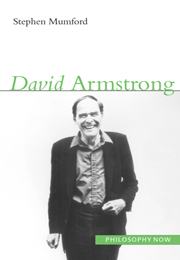2 - Universals
Summary
What sorts of thing are there in the world? Perhaps we might answer with a list: there are people, tables and chairs, cats and dogs, plants, mountains, planets, nuts, bolts, television sets and motor cars. The list is practically endless. It is notable, however, that the things mentioned in this list are all particulars or at least kinds of particulars. A table is a physical object that has a location in space (in my dining room) and a location in time (20 September 2006). For a naturalist like Armstrong, who says that all there is is a single world of space and time, particulars are relatively unproblematic, and few would deny that they exist even though there may be other interesting things to say about them. But some philosophers have suggested that there is another kind of thing that exists. My table is square and the wheels on my car are round. Might it be that squareness itself and roundness itself are also things that exist? Things of this latter kind are known as universals, perhaps because they can be located at any place and any time. Thus, while the table being in my room at a certain time prevents it from being in other places at the same time, squareness being in my room in no way prevents it from appearing elsewhere simultaneously. I may, of course, chop my table in half so that while half of it is in my room, the other half is at the same time in your room.
- Type
- Chapter
- Information
- David Armstrong , pp. 19 - 40Publisher: Acumen PublishingPrint publication year: 2007



